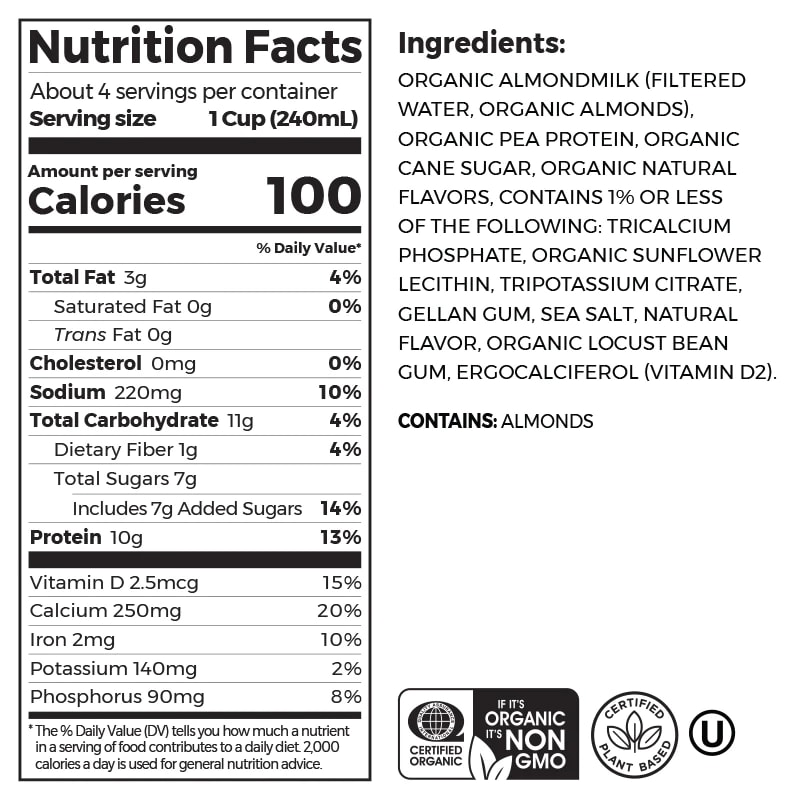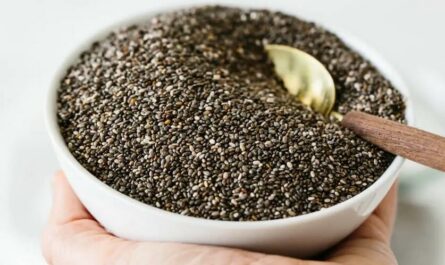Almond milk has become increasingly popular as a dairy-free alternative to traditional cow’s milk. It is not only enjoyed by individuals with lactose intolerance but also by those seeking a plant-based milk option. Almond milk offers a range of nutritional benefits, but it is important to consider both its advantages and drawbacks. In this article, we will explore the nutrition facts of almond milk, as well as its benefits and potential drawbacks. Whether you’re a health enthusiast, vegan, or simply curious, this article will provide you with all the information you need.
What is Almond Milk?
Almond milk is a plant-based milk alternative that is made by blending almonds with water and then straining the mixture to remove any solids. It is a popular dairy-free option for individuals who are lactose intolerant, have dairy allergies, or follow a vegan or plant-based diet. Almond milk has a creamy texture and a slightly nutty flavor. This makes it a versatile substitute for cow’s milk in various recipes and beverages.
To make almond milk, raw almonds are soaked in water overnight or for several hours to soften them. The soaked almonds are then blended with fresh water until smooth. The resulting mixture is strained through a cheesecloth or a fine-mesh sieve to separate the almond pulp from the liquid, resulting in a smooth, liquid milk.

Nutritional Profile of Almond Milk
1. Calories and Macronutrients
One of the most appealing aspects of almond milk is its low-calorie content. According to the nutrition facts label, a single serving (1 cup or 240ml) of this organic almond milk contains only 100 calories. This makes it an excellent choice for those watching their calorie intake or trying to manage their weight.
When it comes to macronutrients, almond milk is relatively low in fat, with 3 grams of total fat per serving[1]. Notably, it contains no saturated or trans fats, which are known to contribute to heart disease risk. This makes almond milk a heart-healthy option for those looking to reduce their intake of unhealthy fats.
Carbohydrate-wise, almond milk is a low-carb delight, with only 11 grams of total carbohydrates per serving. This is significantly lower than the carbohydrate content of cow’s milk, which typically contains around 12 grams of carbohydrates per cup. Additionally, almond milk provides 1 gram of dietary fiber. This is essential for maintaining a healthy digestive system and promoting feelings of fullness.
2. Vitamins and Minerals
Almond milk is often fortified with a range of essential vitamins and minerals, making it a nutrient-dense beverage. This particular organic almond milk is fortified with vitamin D, calcium, iron, potassium, and phosphorus.
Vitamin D is crucial for calcium absorption and bone health, and this almond milk provides 15% of the recommended daily value per serving. Calcium, on the other hand, is essential for maintaining strong bones and teeth, as well as supporting proper muscle and nerve function. This almond milk delivers an impressive 20% of the daily value of calcium per serving.
Iron is a vital mineral for transporting oxygen throughout the body and preventing anemia. This almond milk contains 10% of the daily value of iron. Additionally, it provides 2% of the daily value for potassium. It plays a role in regulating blood pressure and supporting muscle and nerve function.
3. Organic and Non-GMO
One of the standout features of this almond milk is its organic and non-GMO certification. The label clearly indicates that the product is certified organic and non-GMO. This means it is free from synthetic pesticides, fertilizers, and genetically modified organisms.
This certification provides peace of mind for consumers who prioritize organic and non-GMO products, as it ensures that almond milk is produced using sustainable and environmentally friendly practices.
4. Ingredients and Additives
The ingredients list for this organic almond milk is relatively straightforward. It is made from organic almond milk, organic pea protein, organic cane sugar, and organic natural flavors.
Additionally, the product contains less than 1% of various other ingredients, such as tricalcium phosphate, organic sunflower lecithin, tripotassium citrate, gellan gum, sea salt, natural flavor, organic locust bean gum, and ergocalciferol (vitamin D2).
It’s worth noting that this almond milk contains 7 grams of added sugars per serving, which accounts for 14% of the recommended daily value. While this may seem high, it’s important to remember that some brands offer unsweetened varieties.
5. Comparison to Cow’s Milk
When compared to cow’s milk, almond milk stands out as a lower-calorie, lower-fat, and lower-carbohydrate alternative. A cup of whole cow’s milk contains approximately 150 calories, 8 grams of fat, and 12 grams of carbohydrates.
While cow’s milk is a good source of protein, providing around 8 grams per cup, almond milk holds its own with 10 grams of protein per serving.
One area where cow’s milk may have an advantage is in its natural vitamin and mineral content. Cow’s milk is naturally rich in nutrients like calcium, vitamin D, vitamin B12, and riboflavin. However, many brands of almond milk are fortified with these essential nutrients to bridge the gap.

Health Benefits of Almond Milk
Almond milk offers a wide array of health benefits.
1. Rich in Vitamin E
One of the most notable health benefits of almond milk is its high vitamin E content. Vitamin E is a powerful antioxidant that helps protect your cells from damage caused by free radicals. A single cup of almond milk can provide up to 50% of your daily vitamin E needs, depending on the brand and fortification. This antioxidant is essential for maintaining healthy skin, eyes, and immune function.
2. Supports Heart Health
Almond milk is naturally free of cholesterol and low in saturated fats, making it a heart-healthy choice. The monounsaturated and polyunsaturated fats found in almond milk can help lower LDL (bad) cholesterol levels and reduce the risk of heart disease. Additionally, the vitamin E content in almond milk has anti-inflammatory properties that further support cardiovascular health.
3. Low in Calories
For those watching their calorie intake, unsweetened almond milk is an excellent choice. A single cup of almond milk contains only about 30-50 calories, significantly lower than cow’s milk, which typically has around 150 calories per cup. Swapping higher-calorie beverages with almond milk can help reduce overall calorie consumption. This potentially aids in weight management.
4. Bone Health Support
Many brands of almond milk are fortified with calcium and vitamin D, two essential nutrients for maintaining strong bones. Adequate calcium intake is crucial for preventing conditions like osteoporosis.
While vitamin D helps the body absorb and utilize calcium effectively. By choosing fortified almond milk, you can support your bone health and reduce the risk of developing bone-related issues later in life.
5. Lactose-free and Vegan-Friendly
Almond milk is naturally lactose-free, making it an ideal choice for individuals with lactose intolerance. Lactose intolerance is a common digestive issue characterized by the inability to properly digest lactose, the sugar found in milk and dairy products.
By opting for almond milk, those with lactose intolerance can enjoy a creamy, milk-like beverage without experiencing digestive discomfort. Additionally, almond milk is vegan-friendly, as it contains no animal products.
6. Blood Sugar Management
Unsweetened almond milk is low in carbohydrates and has a low glycemic index. This means it doesn’t cause a rapid spike in blood sugar levels.
In addition, It is a suitable choice for individuals with diabetes or those looking to manage their blood sugar levels. However, it’s essential to choose unsweetened varieties. Some commercially produced almond milk may contain added sugars that can negate this benefit.

7. Skin Health
The vitamin E content in almond milk can also contribute to healthier skin. Vitamin E is known for its antioxidant properties. This helps to protect the skin from damage caused by free radicals.
Free radicals can result from normal bodily processes as well as environmental factors like pollution and UV radiation. Consuming almond milk regularly may help promote skin hydration, elasticity, and overall health.
8. Nutrient-Dense
In addition to vitamin E, calcium, and vitamin D, many brands of almond milk are fortified with other essential vitamins and minerals. These may include vitamin A, which supports eye health and immune function; B vitamins, which play a role in energy metabolism; and potassium.
This is important for heart and muscle function. By choosing fortified almond milk, you can boost your intake of these vital nutrients.
9. Versatility in Cooking and Baking
Almond milk is incredibly versatile and can be used in a variety of culinary applications. Its light, nutty flavor, and creamy texture make it an excellent substitute for cow’s milk in cooking and baking.
You can use almond milk to create smoothies, soups, sauces, and even desserts. It’s also a popular choice for cereals, oatmeal, and coffee or tea. The versatility of almond milk allows you to enjoy its health benefits in numerous ways.
10. Easy to Make at Home
While almond milk is widely available in stores, it’s also incredibly easy to make at home. All you need are raw almonds, water, and a blender. By making your almond milk, you have complete control over the ingredients.
Try to avoid any added sugars or preservatives that may be present in commercial varieties. Homemade almond milk also allows you to adjust the consistency and flavor to your liking.
Potential Drawbacks of Almond Milk
1. Allergies
While almond milk is generally well-tolerated, some people may have an allergy to almonds. Nut allergies can range from mild to severe, with symptoms including itching, hives, digestive issues, and even anaphylaxis in extreme cases.
If you have a known nut allergy, it’s crucial to avoid almond milk and consult with your healthcare provider. Some individuals may also experience cross-reactivity with other tree nuts. So it’s essential to be aware of your specific allergies and take necessary precautions.
2. Environmental Concerns
Almond production has come under scrutiny in recent years due to its high water requirements. Growing almonds requires significant amounts of water. This can strain resources in drought-prone regions, such as California.
This can lead to concerns about the environmental sustainability of almond milk production. If environmental sustainability is a top priority for you, consider exploring other plant-based milk alternatives with lower water footprints, such as oat or hemp milk.
3. Nutrient Absorption
Some studies suggest that the nutrients in almond milk may not be as easily absorbed by the body compared to cow’s milk. This is due to the presence of phytic acid. This is a compound found in almonds that can inhibit mineral absorption.
Phytic acid binds to minerals like calcium, iron, and zinc. This makes them less available for the body to absorb and utilize. This can potentially lead to nutrient deficiencies over time.
However, many brands of almond milk are fortified with calcium and other nutrients to help compensate for this potential issue. Additionally, soaking and sprouting almonds before processing them into milk can help reduce the phytic acid content.
How to Incorporate Almond Milk into Your Diet
Almond milk is incredibly versatile and can be used in a variety of ways. Here are some ideas to get you started:
- Smoothies: Blend almond milk with your favorite fruits and vegetables for a nutrient-packed smoothie. Try combining almond milk with spinach, banana, and berries for a delicious and healthy breakfast or snack.
- Cereal: Pour almond milk over your morning cereal for a delicious and nutritious breakfast. It pairs well with a wide range of cereals, from granola to whole-grain options.
- Coffee and Tea: Use almond milk as a creamer in your coffee or tea for a dairy-free twist. It adds a subtle nutty flavor and creamy texture to your favorite hot beverages.
- Baking: Substitute cow’s milk with almond milk in your favorite baked goods recipes for a plant-based alternative. Almond milk works well in muffins, cakes, and quick breads, adding moisture and a slightly nutty flavor.
- Sauces and Soups: Incorporate almond milk into creamy sauces and soups for added flavor and nutrition. Use it as a base for dairy-free alfredo sauce or add it to pureed vegetable soups for a velvety texture.
- Oatmeal and Porridge: Cook your morning oatmeal or porridge with almond milk instead of water for a creamier and more flavorful result. Top with fresh fruit, nuts, and a drizzle of honey for a satisfying breakfast.
- Chia Seed Pudding: Mix almond milk with chia seeds and let it sit overnight for a nutritious and delicious pudding-like treat. Add your favorite toppings, such as fresh berries or chopped nuts, for added texture and flavor.
Conclusion
Almond milk is a nutritious and delicious plant-based milk alternative. It can offer a range of potential health benefits. Its low-calorie content, healthy fats, and fortified vitamins make it an attractive option for those looking to improve their overall diet. While it may have some drawbacks, almond milk can be a valuable addition to a balanced and varied diet.






